By Laurie Wiegler
At 24, Yianni Arhontoulis should be out clubbing, bungee jumping or maybe inventing a mobile app. Instead, this son of a Macedonian immigrant is happily braising tenderloin or bacon-wrapping swordfish at a Pennsylvania inn.
The kid is no flash in the saucepan, though.
Indeed, Arhontoulis’s mature culinary skills brought him to the attention of proprietor Al Granger at Lehigh Valley, Pennsylvania’s Glasbern Inn two years ago. This sustainable 19th-century farm in Fogelsville just west of Allentown, and its award-winning eco-friendly restaurant were soon home for him, first as sous chef before a promotion to executive chef earlier this year.
From Lab to la Table
But this wasn’t always the plan. Before attending the Culinary Institute in Hyde Park, he might have become a scientist. “I wasn’t necessarily thrown into [the restaurant business],” Arhontoulis says, “because I started at tiny restaurants [in Philly and New York City, before graduating to prestigious venues] such as Morimoto’s. I had gone to school for biology at Alvernia University in Reading, Pennsylvania. I did two years there, then got back to work. I started serving and then found the kitchen. I loved the pace, the battle against time and the adrenaline rush.”
He adds that “food and science are so similar, and I think connecting that has been one of my strong points.”
Another goal was to be as sustainable as possible in his work. Glasbern — which functions as an upscale inn while offering guests the chance to sleep in a “farmhouse” — is the perfect venue for this philosophy, where purportedly 90 percent of what’s eaten or drunk was either grown or raised on the farm.
“I love the pace, the battle against time and the adrenaline rush.”–Yianni Arhontoulis
The rest, according to Brian Synder, executive director of the Pennsylvania Association for Sustainable Agriculture, is sourced from local farms. “This is a further indication of how strongly the inn and its staff are dedicated to providing a healthy experience for guests at the same time as contributing to the economic vitality of the community in which it resides, which are hallmarks of a sustainable operation.”
A Cut Above the Rest
Steer and lamb at Glasbern are rotated twice a day. This means that an animal segues from one pasture to the next “to not feel claustrophobic,” says Arhontoulis. “The animals are moving at all times, and when they’re ready [to be slaughtered]…[they’re moved out.]”
While slaughtering is not done at Glasbern–that job goes to a company called Springfield Meat–Arhontoulis does do all the butchering onsite, keeping meat whole in a chambered Cryovac machine, a blast freezer, which allows him to pack without air.
He insists that it’s as pleasant a life as possible for the animals, which are grass-fed–tastier for the diner and more enjoyable for the steer, hog or lamb during its lifetime.
Now here at Glasbern’s farm, amidst Scottish Highland cattle, Katahdin sheep and an elaborate herb garden, Arhontoulis is pretty much assured that what he’s about to serve guests tonight at dinner he passed earlier on the walk into work.
Chef du Jour
As executive chef, Arhontoulis–who manages a team of seven–adores the challenge and creativity of mixing it up daily.
“I do something different every night,” he claims, “although I do have an essential base menu going into the seasons and I stay in communication with the gardeners [as to what is on hand to offer],.. [for example] we may get beautiful Tokyo turnips or something else from the garden that I’ll use.”
So Arhontoulis pokes around the 130-acre farm, culls what’s needed, and then he and sous chef Nate Weida “script out a menu, using different ratios and methods to help us … fill in where we need to.”
For example, a highlight the week of October 3 was the aforementioned bacon-wrapped-swordfish. “It was put on the menu two days ago, and we’re introducing it tonight.” Some of the concoction is his while another part was learned at the culinary institute. “I learned the fundamentals in culinary school and I read a lot, but this [entrée] is also a bit of my own creativity,” he says.
What he does at Glasbern is farm-to-table-driven, “but I am also a huge advocate of contemporary methods, [such as] sous vide–cooking something in a completely oxygen-free environment so no impurities are introduced to the vegetables or piece of meat.”
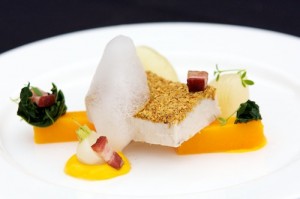
The science geek within Arhontoulis makes him a fan of gastronomic techniques such as sous vide and emulsifying.
Forced to brag a little, Arhontoulis says that his Dayboat Scallop creation (with browned butter, oxtail and salted caramel); Grass-fed Beef Duo (shortribs plus sirloin); Swordfish confit a la minute (squash, cipollini, pumpkin seed and la chouffe) as well as Chestnut Tagliatelle (with honey crisp apple, celeriac and smoked maple) are pretty good.
“Ahead of its time”
Snyder says it really is the dining experience that makes Glasbern and in turn, Chef Arhontoulis and team stand out.
“While the concept of mixing sustainable agriculture with the hospitality industry is not unique, and can even be found more readily around the country and the world as the sustainable farming movement gains momentum, Glasbern is distinctive in its very specific desire to maintain a top quality dining experience,” says Snyder.
Certainly, the culinary and wine communities appear to agree.
In September Chef Weida helped Glasbern snag the 16th Annual Pennsylvania Taste of Elegance chef competition, sponsored by the state’s pork producers council, for his pork tenderloin prepared sous vide with succotash.
Arhontoulis says Weida won that for the team, but Glasbern — which has garnered several Wine Spectator awards for its extensive French and California varietals alone — enters competitions frequently.
“Last week was Taste of the Lehigh Valley, with about 500 guests tasting local ingredients. The theme was ‘utilization of local farms,’ being as local as possible. I brought a farmer with us to talk about food and different ingredients,” says Arhontoulis.
How Sustainable Are They?
Snyder says that being truly accurate about sustainability is almost impossible, given the need to factor in such elements as soil and water quality and energy use, but Glasbern comes as close as possible to full-scale sustainability.
He says that because the inn and its restaurant are so keenly committed to using what they grow and raise on the farm, it’s distinctive.
“Patrons can literally see where much of the food has been raised right outside the windows, on the immediate grounds of the establishment,” Snyder says. “In this sense, they are very much ahead of their time.”
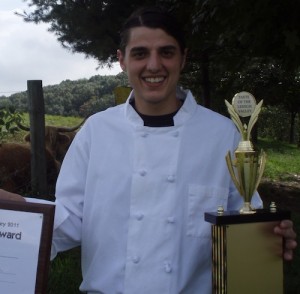
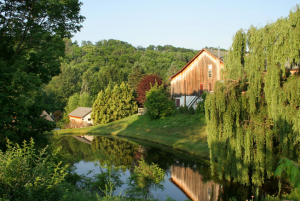
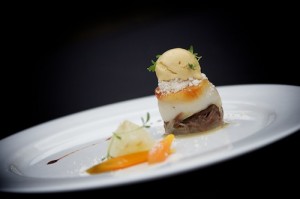
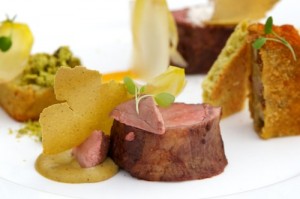
You'll be hearing more from him. Yianni Arhontoulis, the 24-yr-old chef to watch. New on Toque http://t.co/sj5eNEI8